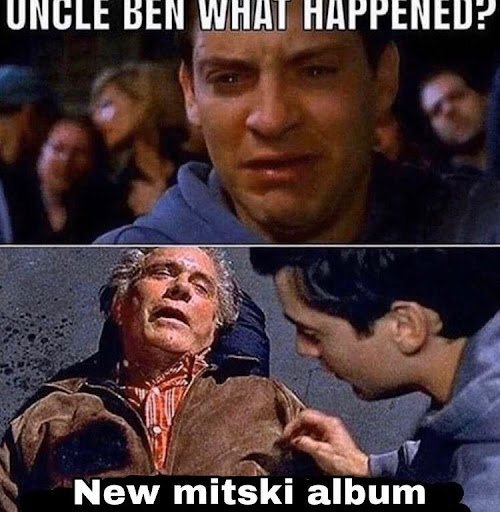Laurel Hell: Breaking the Sad Girl Schtick
Debuting in 2012 with Lush, Mitski slowly but surely climbed her way up the ranks of indie rock stardom throughout the 2010s. By the release of her critically acclaimed album Puberty 2, she stood as a voice for an underrepresented demographic in the white, male dominated indie scene. However, as Mitski’s fan base grew, the amount with which she was willing to share her personhood diminished. And following 2018’s Be the Cowboy, she officially purged all social media, leaving the accounts solely in the hands of her management. Now, after four years of silence and a claim of indefinite hiatus, Mitski has dared to share herself with us again in Laurel Hell. But how well can we understand the version of herself she's put forth?
One major gripe Mitski has often discussed is the tendency of listeners and critics to pigeonhole her music. The "Sad Girl" aesthetic was integral to the youth culture of the 2010s — a new coat for teen angst knitted by the advent of sites like Tumblr, a cursory cultural understanding of feminism, and a desire for an alternative to the mainstream. During that period, few indie rock outfits matched Mitski’s depth of lamentative lyricism, bass heavy songwriting and emotive baritone.
But Mitski has a charm that never fit under the reductive “Sad Girl” umbrella. Her sarcasm, her flair for metaphor, her wit and her willingness to experiment -- this is the artist who named an album after a quote from The Simpsons, whose sense of humor lives on in archived Twitter screenshots still circulating to this day. She garnered a cult following not by publicly sulking harder than everybody else, but by appearing genuine and giving as much of an impression of a real person as seemed possible. A relatively young artist sorting through life and the industry who would understand an obscure meme referencing a Palm D'or winner.
Laurel Hell, more than anything, demonstrates the progression of Mitski’s artistry. It’s bursting with cavernous synths and light chord progressions, balancing dark emotions and the joy that can come from art based on them. The pace of the album seems to wind and leap according to this duality. For every slow track, there's a quick earworm.
Be the Cowboy similarly employed this style, with the lead single “Nobody” becoming something of a breakout hit. But, where that album leaned into a folksy sound, Laurel Hell pursues something more akin to post punk. Guitars are rarely the focus, drums are often layered in reverb and synths always hint at something pensive behind even the fastest beats.
It also grapples with her public life as much as intimate personal sadness, often blurring the line between personal loneliness and the anxieties induced by her music career. As Mitski’s persona has become more withdrawn, the cinematic qualities of the album seem more deliberate and grandiose. If her early projects have the feeling of a directorial debut at Sundance, she’s now stepped into the realm of auteur, who needs not worry about shopping projects around to distributors.
It's perhaps in this tenuous relationship to the spotlight that the opening track, "Valentine, Texas" resides. The name calls back to "Texas Reznikov", the first song on 2014's Bury Me at Makeout Creek. But where the latter was a quiet love song, the former seems to describe the process of returning to performing. The song begins with Mitski instructing, "Let's step carefully into the dark / Once we're in, I'll remember my way around", slowly leading us down toward a burst of synths, ready to confront the chaos "out where the dust devils are made."
Immediately following this mission statement, the lead single "Working for the Knife" plainly explores the reality of translating her pain and passion into a product with slow, monotone delivery over standard pop structure.
But for each of these key-led ballads, there is an upbeat piece of art pop that embraces the dark subject matter Mitski is known for. On "Stay Soft" for example, she builds a story about using sex as a coping mechanism. It's a deceptively bubbly, sensual song, with dramatic hooks to match the melancholy at the heart of its lyrics.
These songs rise and flow into one another like tides, and the album plays out like an internal struggle for closure. Whether it's the funk tinged sense of resolve in closing number "That's Our Lamp," the constant rush of reckoning with isolation and the contradictory nature of her music defining her in "Love Me More," or the slow rising reflection on her career path in "Everybody," each song explores the relationship between sorrow and artistry in its own way. When Mitski last allowed us this level of intimacy, she was very direct about the struggle to keep her personal life separate. To allow an audience back into that space is to return to that conversation in earnest, facing both the joy of expression through music and the challenges of drawing upon painful emotions for others to consume.
Laurel Hell doesn't shy away from saddening material. But it's like sitting down for a gloomy, cathartic movie. It leads you with a trained hand into caverns and whirlwinds. Once released into the open air, there is triumph in seeing the dust settle, but it's ultimately the story its creator wished to tell — not the sum of their life's work. For longtime fans, it's great to hear new Mitski. It's even better to feel her working out the troubling business that drove her to reclusiveness and deigning to communicate that to us.
[Erick Zepeda is a writer and filmmaker based in Los Angeles. More of his work can be found at https://erickalexanderzepeda.wordpress.com/]



